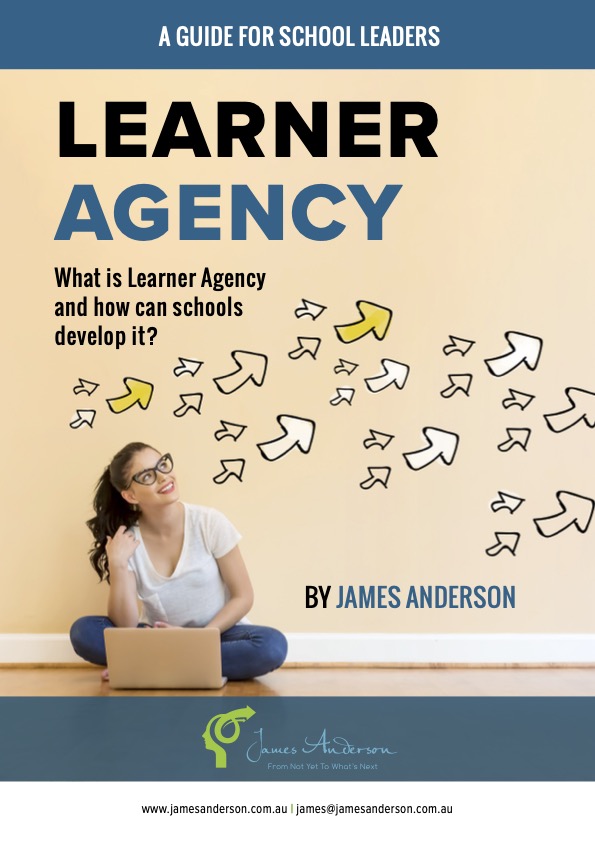Never Work Harder Than Your Students
Probably the best piece of advice I ever got as a teacher was “never work harder than your students.”
One of my former mentors, Joanne Roberts, told me that. A fantastic principal, with a deep understanding and love of learning. Joanne was all about giving students responsibility for their learning. She played an important role in how I came to understand the process of learning. She helped me understand the complementary roles of the teacher and learner in the learning process.
I think of it like this. In a room of 30 students and a teacher, there’s a cognitive load that needs to be lifted. 30 students need to go from not knowing or being able to do something, to knowing or being able to do it. That’s the hard work of learning. And the question that needs to be answered is who’s lifting that load?
Our prevailing teaching culture means that in many schools, the teacher is doing most of the heavy lifting. We’ve been told teachers are responsible...
How to start a year of skilful learning
How should we start the school year if we want our students to develop learnership?
That was the question a New Zealand principal I work with asked me as I was working with his staff this week. He wanted to know how his teachers should set up the start of the school year to ensure they are valuing and developing the skill of learning. What norms and expectations should they be establishing?
This was my response.
1. Learning is a skill. Respond with awe!
First, teachers should recognise and celebrate learning as a skill. Learning must not be something you simply do. It must be something you learn to do well! Students must be seeking to get better, at getting better. In doing so, you raise the status of learning from an act, to an art throughout your school.
I asked the teachers to think about the way they responded when they see something done skilfully. Try it for yourself now. What do you think of and recognise when you see something being done skilfully?
For me,...
Your Ultimate Guide to Learner Agency
There’s a lot of talk in education at the moment about Learner Agency (A.K.A student agency). In the name of agency we are supposed to give students “voice and choice” in their learning. But there’s something very important that we are missing.
What is Learner Agency

Without digging into the philosophical roots of agency, the concept is probably most easily described by thinking about what it’s not. Someone who lacks agency becomes the victim of their circumstances. They feel powerless, unable to influence the world around them, particularly when facing adversity.
Someone with agency is powerful, when they are confronted with adversity, they can take action and influence their world. They have a voice in the world, and they have the power to exercise their free will to make choices. They are the master of their circumstances.
Voice and Choice: A Sense of Agency?
The idea that someone with agency has a voice, and can make...
What Is Learnership?
As I continue to work on my new book, I've been reflecting on a question I often get asked: What is learnership?
It's a fair question. Afterall, it's a word I made up. I like to think of Learnership as the coming together of learning and craftsmanship. It helps us shift from what we are learning, to how we are learning and then to how well are we learning. In doing so, it raises the status of learning in your school from an act, to an art.
When Daniel Goleman introduced the world to Emotional Intelligence the idea that emotions and intelligence could go together seemed crazy. In fact, before Goldman’s work emotion and intelligence were often thought of as opposite, or at least separate, abilities. Today of course the idea of emotional intelligence is not only well understood, it is considered an essential skill to develop for success in life and work.
Similarly, when Edward de Bono coined the term “lateral thinking, it...
My new book… Learning to struggle
Over the past few weeks, I’ve been working on my next book Learnership for Leaders. And it’s got me thinking about challenges again.
When I started writing, I realised I was writing at the same standard as “The Agile Learner” and “The Learning Landscape.” Both of those books are good books. But I want Learnership for Leaders to be a great book. It’s going to put Learnership on the map and raise the status of learning in our schools from an act to an art.
And that level of writing is challenging me. It makes me uncomfortable. I struggle. I can’t tell you the number of tasks that suddenly seem important (tidying my desk, answering that email) every time I sit down to write.
I need to remind myself that struggle is necessary for growth. It’s like Morgan Freeman says:
“Challenge Yourself. It’s the only path that leads to growth.”
The effort and struggle associated with challenge is the cost of growth. There is no...
Australian Education Award Finalist - Learnership Case Study
It has been my pleasure and privilege to collaborate with teachers and leaders at Asquith Girls High School (AGHS) in Sydney since 2019. Together we have created a powerful and innovative program to nurture growth mindsets and develop learnership in their 650 students. And I am absolutely thrilled that Asquith Girls High School has been recognised as a finalist in the 2022 Australian Education Awards for best student wellbeing program.
Known in the school as AIM (Asquith Individualised Mentoring) the program pairs each learner with a teacher mentor to support them in creating and articulating their learning goals. The program draws on my work to nurture a growth mindset, build learnership capabilities and develop the Habits of Mind in students. I have provided staff with ongoing professional learning and the structures and resources to help them effectively implement these ideas in every classroom, every day.
The school has done an...
Every Mistake You Make is NOT Progress – Every Mistake You Correct Is Progress
How learners understand and respond to mistakes is an important aspect of Learnership.
There’s been a lot of well-intentioned hype surrounding the role of mistakes in learning on social media, in parenting groups and even among teachers and administration. And while the concept is good, the application isn’t quite right. In fact, when it comes to the role of mistakes in learning, we’ve been getting it all wrong.
If social media is to be believed teachers should be praising, even celebrating, their students’ mistakes. They should even be encouraging students to make mistakes with the idea that this is the path down which real learning lies. But I think what social media has to say about mistakes has largely missed the point.
Not All Mistakes are Equal
Social media and parenting groups tend to oversimplify the role of mistakes in learning. For example, "every mistake you make is progress" is simply not true. Often a mistake is unintended...
Future Proof your Students: The Role of Learnership and Habits of Mind
The Habits of Mind are one of the true classics in education. Described by Art Costa and Bena Kallick, these 16 dispositions define the effective, efficacious thinker. They are the dispositions of an expert problem solver, a thoughtful decision maker and a creative thinker. They promote strategic reasoning, insight and perseverance. And they describe how successful problem solvers behave when they are in their Learning Zone.
It’s not surprising that the Habits of Mind should form a central role in Learnership. In fact, fostering a good understanding and appreciation for these Habits of Mind is an important part of how teachers can help students become skilful learners. As part of my Learnership Intensive I’ll show you how to work with the Habits of Mind help your students become more skilful learners.
Habits Of Mind and the Skilful Learner
How do the Habits of Mind help turn students into skilful learners? First, it provides a shared language...
Safe and Supportive. But not easy
This week I’d like to share a personal story, as a metaphor for why we need to think carefully about how we create safe and supportive learning environments – lest "Safe and Supportive" gets in the way learning.
A few years ago, a group of friends and I took up indoor rock climbing. It was a lot of fun and great exercise. And like anything, it got easier as we got better at the techniques.
One day I decided that I wanted to challenge myself and try a new route. In rock climbing, difficulty is ranked by colour, and this would be the first time that I would be going up the more difficult blue route.
I got started...
Are your students unmotivated, or de-motivated? And how to help
But the real problem is… they lack motivation.
How do you motivate students?
If you’re wondering how to motivate your students, you’re not alone. Motivating students ranks as one of the biggest challenges for teachers. We’re all working towards the same goal.
But before we can understand how to motivate students, we need to understand why they lack motivation in the first place. And to do that we need to understand the reason for the lack of motivation – are the students un-motivated or de-motivated?

Sometimes students simply don’t want to learn the things we’re trying to teach them. They are completely disinterested. They’ll say things like, "when am I...
